Lawmaker Says Iran Can Build 500,000 Homes In Syria
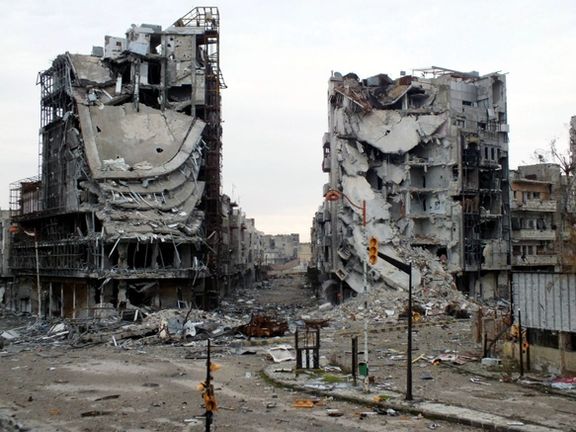
A member of parliament has said Iran is ready to build up to 500,000 residential units in Syria as part of that country’s reconstruction projects.

A member of parliament has said Iran is ready to build up to 500,000 residential units in Syria as part of that country’s reconstruction projects.
Mohammad-Reza Rezaee-Kuchi, who is the chairman of the Islamic Republic parliament’s construction committee said he was in Syria recently with a delegation of Iran’s ministry of roads and urban development to discuss how Iran could participate in the reconstruction of the war-ravaged country.
Two years ago, Iran signed an agreement with Syria to build 30,000 residential units, but a deputy minister later said the government could build 200,000 units.
Government officials had said earlier that Iran does not intend to pay for the projects but wants to secure a role for its companies in Syria’s construction. This would undoubtedly include the Revolutionary Guard construction arm, Khatam ol-Anbia, which has a dominating position in Iran due to its political clout.
Iran, which is suffering from a serious economic crisis, is unable to repair its own schools and complete public works. During mass protests in recent years disgruntled citizens have chanted slogans against involvement in Syria and elsewhere while many Iranians increasingly fall into poverty.
Hardliner president Ebrahim Raisi has promised to build 4 million apartments for low-income people during his term in office but so far, there is no sign of any construction.
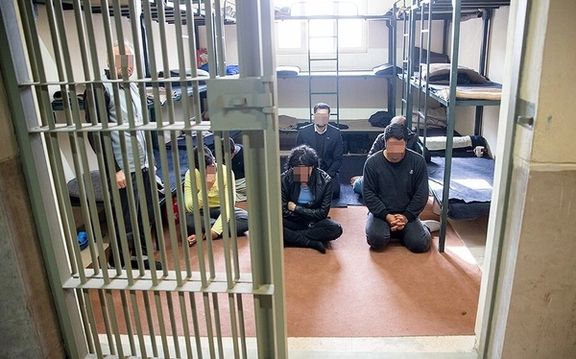
Guards and medical staff in a prison in Iran have attacked and beaten a number of political prisoners who had started a hunger strike.
Saeed Tamajidi, one of the prisoners who was arrested during 2019 popular protests also known as the Bloody November, broke the news in a Friday phone call from the Greater Tehran Central Penitentiary also known as Fashafuyeh.
He said several prisoners on hunger strike who were feeling sick were taken to the prison infirmary to register their vital signs but were insulted and threatened with a knife by one of the doctors there.
He added that following an argument, the doctor attacked him with a knife and medical staff and guards started beating him and others, injuring several of the prisoners.
Tamajidi said they were on a hunger strike to protest lack of proper care by the prison’s authorities and the death of Baktash Abtin a poet and a political prisoner.
Abtin died of Covid-19 complications following days of medically induced coma earlier in January after he was denied timely treatment by officials at Tehran’s notorious Evin prison.
A People's Tribunal organized by human rights advocates is slated to hold its next session in a few weeks to investigate the atrocities during the November 2019 protests, which were the bloodiest in Iran’s history with security forces opening fire on demonstrators in many cities, killing hundreds.
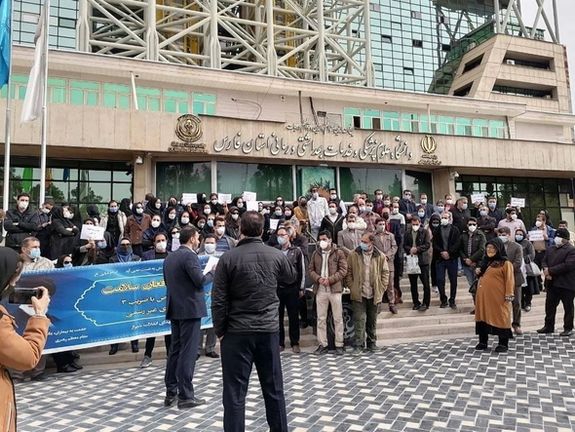
Iranian teachers have started a nationwide strike to demand higher salaries and release of their colleagues who were arrested during previous protests.
According to the Coordination Council of Iranian Teachers’ Trade Associations, the strike, which started on Saturday will last for two days and will be followed by a protest rallies.
This week’s demonstration is scheduled for Monday, while the teachers have announced they will stage another strike and protest in about two weeks too.
In the previous rounds of rallies, the teachers gathered in front of the parliament building in Tehran and the provincial offices of the education ministry to protest the parliament’s adoption of a discriminatory ranking plan.
Also on Saturday, Iranian nurses held protests in many cities across the country to protest higher pay and long-term contracts.
Workers and employees from various economic sectors hold regular protest rallies or strikes to demand better working conditions and salaries.
Earlier in January, hundreds of firefighters and staff members from Iran’s hardliner judiciary department took to the streets in several cities, in what was an unprecedented development. Even prison guards have picketed to protest their low salaries.
Food prices have risen by more than 60 percent in recent months, on top of high inflation in the previous three years, while the government is unable to sufficiently boost wages
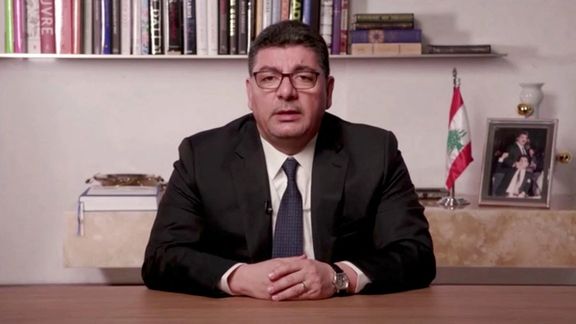
Bahaa al-Hariri the son of slain former Lebanese Prime Minister Rafik al-Hariri has announced he is entering politics after his brother Saad pulled out of public life.
Bahaa, 55, said he would "continue the journey" of Rafik al-Hariri, who, with Saudi backing, established the Hariri family as the dominant player in Lebanon's Sunni community before his assassination in 2005. Iran-backed Hezbollah was accused of carrying out a bloody bombing that killed the prime minister.
Saad al-Hariri, a three-time prime minister who made compromises with Hezbollah, lost some of influence and backing from Saudi Arabia, before he withdrew from politics.
Saad's announcement upended Lebanon's sectarian politics four months before a parliamentary election, adding to the uncertainties facing a nation grappling with a devastating financial crisis.
"Through partnership and solidarity, we will enter the battle to take back the country and the sovereignty of the country from its occupiers," said Bahaa, an apparent reference to Hezbollah of which he is a fierce critic.
Although he will not be a candidate in the upcoming elections, Bahaa said, "The son of the martyr Rafik Hariri will not leave Lebanon, I am with you and very soon I will be among you.”
It is not clear if Bahaa can fill the void left by Saad al-Hariri and put up a serious challenge to Hezbollah’s influence.
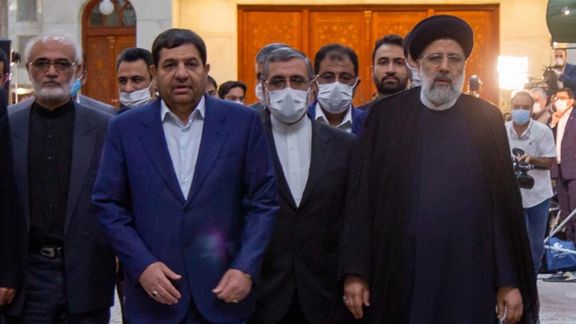
Media and critics have published the names of many appointees in Iran's government who are relatives of top officials, after the president's categoric denial.
Raisi responded to a question in a televised interview Tuesday night about giving big jobs to his and his ministers' relatives and friends, by saying that all appointments in his government are based on merit and insisted that no one can name even five individuals in his government who have been appointed to a post based on their family ties.
Raisi said if anyone knew of five cases, they should name the individuals, and he would launch an investigation into the matter. Earlier, Supreme Leader Ali Khamenei had also told the government to look into the matter and eliminate possible doubts in the government's integrity.
During the past two days, first moderate website Rouydad24 named and published the pictures of two dozen officialswho are either Raisi’s and his wife's relatives or are the relatives of some other top officials in the government. Later, Aftab News website also quoted social media users who had named far more than five such cases. The website, however, politely observed that Raisi may have been misinformed by his aides about nepotism in his government.
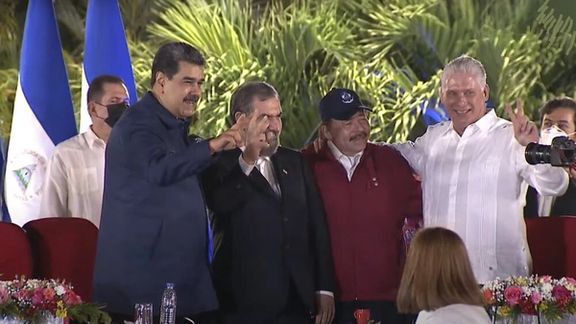
Among those named by Rouydad24, there are a few relatives of Raisi and his wife including Meysam Nili, a brother of Raisi's son-in-law Meqdad Nili, who has been appointed as an adviser to Culture Minister. He also has a second job as an adviser to the chairman of the Islamic Propagation Organization. Meanwhile, a cousin Raisi’s wife Zeynab Kadkhoda has been appointed as the dean of the faculty of Dentistry at the University of Tehran.
Mohammad Mehdi Ahmadi, the son-in-law of Mohsen Rezaei the vice president for economic affairs was first appointed as the governor of Bank Saderat, but stepped down quickly as soon his family connection to Rezaei was disclosed on social media. However, after a few weeks, Ahmadi was appointed as the governor of Bank Shahr affiliated with the Municipality of Tehran.
Mohammad Mehdi Rahimi, a close relative of former Majles Speaker Gholam Ali Haddad Adel, who is himself a relative of Khamenei, has been appointed as the director general of public relations at Raisi's office. In another appointment, Elham Akbari, the wife of influential lawmaker Ahmad Naderi has been appointed as an adviser to Culture Minister.
In similar developments, Sajjad Safar Harandi the son of Expediency Council member Mohammad Hossein Saffar Harandi has been appointed as the new manager of the Islamic Art and Culture Center, Hossein Amerian, the son of another influential hardliner Lawmaker Ms. Laleh Eftekhari has been appointed as the chairman of the pension fund of Iran's Steel Industries, and Davoud Azizi, a brother of lawmaker Mohammad Azizi who has studied nursing, has been appointed as the chairman of the Islamic Republic's Tennis Federation.
On the other hand, Health Minister Bahram Einollahi has appointed his son-in-law Shahed Fadaifar as his adviser at the ministry, and Mohammad Mohammadian, an official at Khamenei's office has helped his son-in-law Mehdi Eslampanah to rise to the position of the chairman of National Standards Organization.
Several others have also been named by the two websites. However, Aftab News claimed that Raisi should not have strictly denied the possibility of nepotism. He should have known that even one example of nepotism can tarnish his integrity. Raisi was so certain about his claim that he called those who talk about nepotism in his government as "accomplices of the enemy."
The Iranian Labor News Agency (ILNA) quoted Wahab Azizi, a conservative activist and leader of Jahadgaran Party which supported Raisi in the presidential election as saying that that Raisi and his aides are distributing power through these appointments in a way as if “they have conquered a foreign country.”
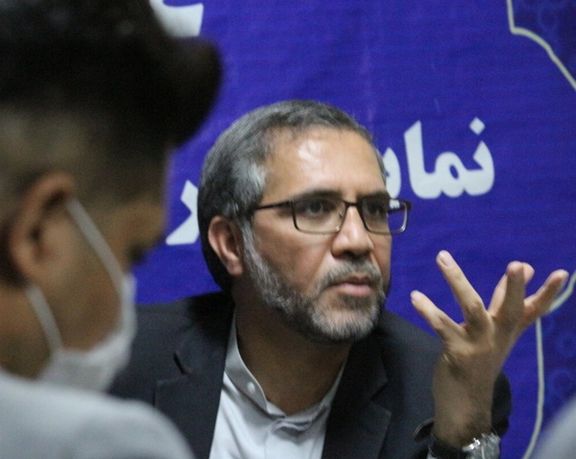
An Iranian lawmaker said Friday that the long-term agreement signed with China does not need ratification by parliament because it is not “a binding” contract.
Abbas Golru, member of parliament’s national security and foreign policy committee told Tasnim news agency in Tehran that the 25-year agreement with China is a document of understanding and “a framework for cooperation.” He added that so far, no binding treaty or agreement has been signed between the two countries.
In recent months, the Islamic Republic has touted the agreement with China as a major political and economic breakthrough that would provide a lifeline for its broken economy amid United States' sanctions. In mid-January, foreign minister Hossein Abdollahian visited Beijing and discussed expanding relations. Tehran claimed that the 25-year agreement was “activated” during the trip.
Iranian politicians who are currently out of power, as well as pundits and thousands of Iranians on social media have criticized the regime’s quest to attach itself to China and Russia. Tehran is also trying to sign a 20-year deal with Russia, but so far, Moscow appears not to be interested. Many have also questioned the fact that the contents of the agreement have been kept secret.
Golru also maintained that for the deal with China to become binding specific agreements must be signed in various fields and ratified by the parliaments of both countries.